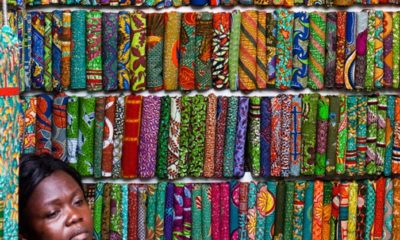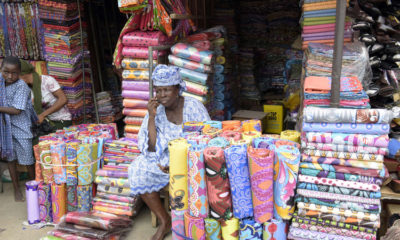- CBN Gov Sets up Panel to Revive 50 Textile Firms
The Central Bank of Nigeria is targeting to revive at least 20 textile companies before the end of the 2019 fiscal period.
The move is contained in the technical cooperation proposal for revamping the cotton, garment and textile sector in Nigeria.
The proposal was made available to our correspondent shortly after the inauguration of the textile implementation committee.
The committee was inaugurated by the CBN Governor, Mr Godwin Emefiele, on Thursday in Abuja.
Present at the event was the Governor of Kano State, Abdullahi Ganduje, and the Deputy Governors of Kaduna and Jigawa states, among other stakeholders in the CTG sector.
The committee, according to the proposal, is saddled with the responsibility to resuscitate at least 50 textile firms by the end of 2023. The committee is also expected to collaborate with stakeholders to identify, name and shame textile smugglers in Nigeria as well as develop a framework for the eradication of smuggling and dumping of textile products into Nigeria.
The committee would also facilitate the production of 200,000 hectares of cotton fields by 2020 and maintain an annual increase of 100,000 hectares over the next three years.
Other tasks of the committee include to determine power requirements by the textile hubs in each state; develop a framework for the production, transmission and pricing of power within the hub; and facilitate collaboration among all related agencies to ensure compliance with regulations.
It is also expected that the committee would work assiduously to deliver a minimum of 50 megawatts of captive power to CTG firms in the interested states by 2021, and facilitate the effective pricing and delivery of gas, black oil and diesel to CTG firms in Lagos and other interested states.
This is expected to enhance their power generation and consumption.
Speaking at the event, Emefiele noted that the CTG sector within the last 20 years had suffered a lot of difficulties.
He gave the key challenges affecting the CTG sector to include low cotton production, poor power and transport infrastructure, obsolete production lines, smuggling and counterfeiting, inadequate local patronage, high cost of production, and multiple taxation , among others.
The apex bank boss said while farmers and processors had had to deal with low-quality seeds, rising operating cost and weak sales due to the high energy cost of running factories, smuggling of textile goods, and poor access to finance were having a negative impact on the growth of the sector.
For instance, he said smuggling of textile goods alone had been estimated to cost the nation over $2.2bn.
He said, “It’s no secret that the past 20 years have been very difficult for the cotton, textiles and garment sector.
“Today, most of the textile factories have all stopped operations and the workforce in Nigeria’s textile industry stands at less than 20,000 people.
“In addition, a large proportion of our clothing materials are imported from China and countries in Europe.

 Naira4 weeks ago
Naira4 weeks ago
 Naira4 weeks ago
Naira4 weeks ago


 Naira4 weeks ago
Naira4 weeks ago




 Naira3 weeks ago
Naira3 weeks ago
 Commodities4 weeks ago
Commodities4 weeks ago


 News4 weeks ago
News4 weeks ago


 Banking Sector4 weeks ago
Banking Sector4 weeks ago
 Travel4 weeks ago
Travel4 weeks ago


















